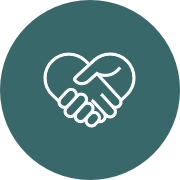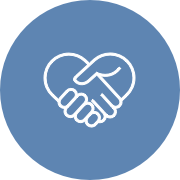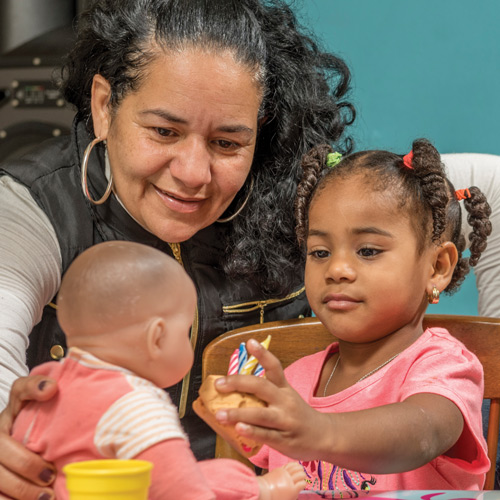
Early Intervention
In the front room of Zulaika’s home, Early Intervention Special Instructor Maribel Garcia is singing “Twinkle, Twinkle, Little Star” with Naomii, Zulaika’s two-year-old granddaughter. When the song concludes, Maribel gently guides Naomii to bake a Playdoh cake for the tiny doll she has in her hands. Maribel has worked with Naomii for more than a year, ever since Zulaika took over custody of her two granddaughters.
RHD’s Early Intervention program works with children identified as having early childhood medical diagnosis or developmental delay. An Early Intervention special instructor works with Naomii on skills in social and emotional development as part of her referral by the Department of Human Services.
“Naomii’s response to Maribel was rocky in the beginning,” Zulaika said. “Naomii only spoke with her hands — and that came in the form of hitting those around her.”
Today Naomii communicates in English and Spanish, and Zulaika reports that her behavior is much improved.
“I’m very happy with Naomii’s progress,” Zulaika says. “I’m blessed with all the services and the people who have worked with Naomii since the beginning.”
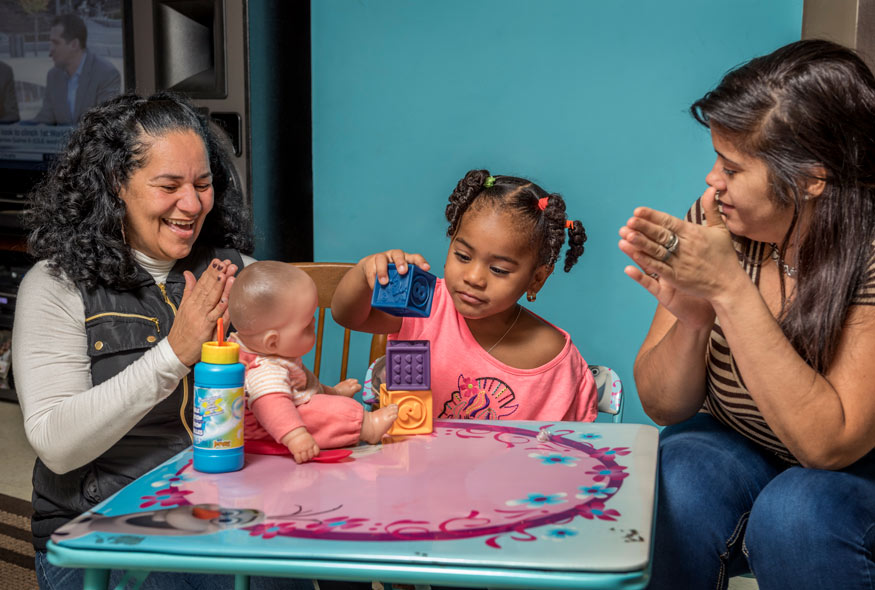
Supporting more than 200 children, RHD’s Early Intervention empowers families and caregivers to deliver skills and strategies that improve their child’s development in their natural learning environment. Home and community-based services are delivered to parents and caregivers of children from infants to preschoolers.
From Special Instruction to Occupational and Physical Therapy, to Social Work and Nutrition, Early Intervention offers services to families of varying socioeconomic backgrounds. In-person and phone interpretation are also offered for parents who do not speak English.
Early Interventionists work in collaboration with families and caregivers to develop goals. The team also works together to develop the specific service and/or educational plan that is designed to maximize the children’s strengths and help them learn new, more progressive ways of functioning. Therapeutic activities such as playing, dressing and eating can be a large part of understanding the child’s growing needs.
Naomii’s therapy goals include improvement of language skills and better control of her behavior. Their sessions have come a long way. When Maribel first began working with Naomii, the little girl’s verbal communication skills were very limited.
Besides the utilization of songs, playtime, and art projects, Maribel communicates with Naomii in English and in Spanish, a language she’s known since birth. She worked to create a comfort zone for Naomii, making a slow but steady impact.
“When you’re in the home, you’re working with the family, you’re impacting their whole environment by your presence,” RHD Early Intervention Director Shawna Sidibe said. “Working with the family is key in the child’s development. Having an opportunity to work with children in Early Intervention prepares them not only for school age programming, but even for reducing some of those risk factors that could happen in adulthood.”
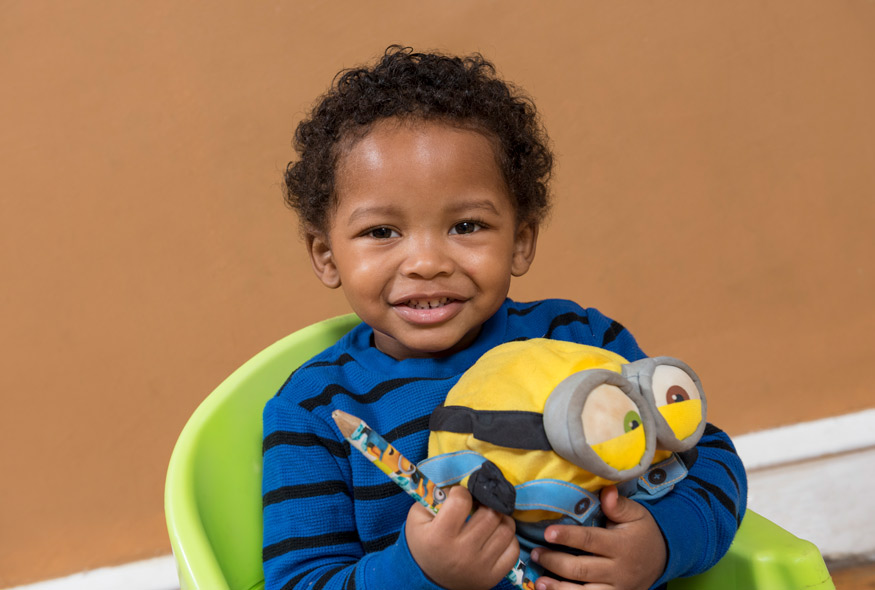
When RHD Early Intervention Special Instructor Sa’de Edwards arrives at La Toya’s home, she greets La Toya’s two-year-old son Lynden with a slew of questions:
“Good morning! Did you miss me? What do you want to do today?”
La Toya found her way to Early Intervention services through a referral, after a worrisome few months of fear that Lynden was lagging behind other children his age in vocabulary. La Toya’s pediatrician recommended an Early Intervention evaluation.
“From the first time Sa’de came here, she was on Lynden’s level,” La Toya said. “She made it fun and was about interacting with Lynden as a person. She stepped outside of what her job was and engaged him.”
During a break, Lynden pulls out a skateboard from his toy chest that is almost larger than he is. Sa’de immediately prompts him to verbalize “push” and “pull” as he maneuvers the board in the small living space. As Lynden echoes the words, his mother looks on with a smile.
“Early Intervention has had a huge impact,” La Toya said. “Since Sa’de has come in and we’ve obtained these services, it’s been amazing. Lynden has surpassed where I thought he would go.”
Early Intervention is just one example of how RHD has been a pioneer in creating unique programs for children. Thousands of children and their families have found caring, effective support at RHD that has helped them achieve their behavioral and educational goals.
RHD’s children’s services continuum is very diverse, but the way RHD delivers services is similar. All RHD programs are trauma-informed and person-centered, and family engagement is a significant initiative.
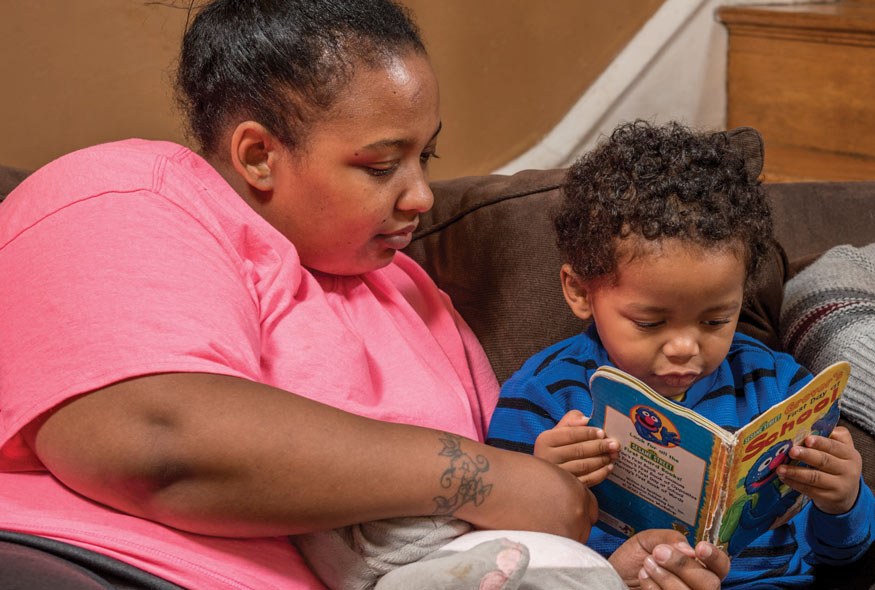
RHD supports families of all backgrounds in ways that work best for them, by going into the home to deliver personalized service at the highest level.
“It’s rewarding,” Sidibe said. “This program has been in existence since 1996 and we’ve been able to serve multiple families as a result.”
As the session with Sa’de winds down, Lynden takes a yellow truck from his toy chest and places his plush grey hippo on top of it. As he pushes the truck around the room, Sa’de has one more request for Lynden: “Repeat after me — five, four, three, two, one!”
After he repeats the last number, Sa’de smiles and says: “Good job, buddy! We’re all done!”

